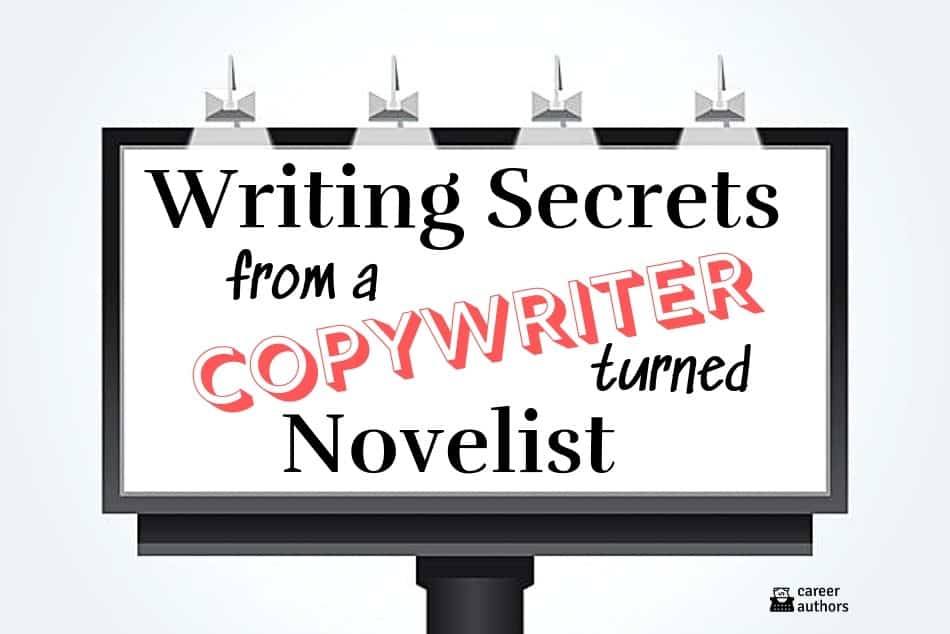I like to tell—well, pretty much anyone who will listen—that writing for a living didn’t prepare me to write for a living.
Despite the fact that I’d written for my supper for more than two decades as an advertising copywriter, racking up Lucite trophies and even praise from John Grisham (yes, THAT John Grisham), I was ill-prepared for the rigors of novel-writing.
After all, penning television commercials, magazine ads and billboards is a far cry from writing a novel. There’s the sheer volume of words required to birth a book. The difference between writing for a quick impression versus spinning a multifaceted and compelling yarn. The inherent complexities found in books but absent in ads, from character arcs to overriding themes and nearly everything in between.
But lately I’ve been thinking that there are lessons to be learned from this uber-short form factor. (And not just because James Patterson, former Mad Ave ad guy and the patron saint of copywriters, has an empire the Romans would have envied.)
So I’ve compiled a list of things I learned as a copywriter that have sustained me on the journey to from idea to publication, first book to third. I hope Patterson would approve.
Grab the reader by throat
I’m under no illusions. I know that, save for Super Bowl and a certain talking gecko, most people skip the ads. To pique—and maintain—attention, copywriters must create an ad that grabs the audience by the throat (or collar) and never lets go. The same applies to novel-writing. From the cover to the dust jacket blurb to the first sentence to the last page, it’s imperative to keep the reader engaged. Start with a great premise. Engross with a tantalizing hook. Raise the stakes and crank up the volume. Give readers reasons to turn the page so that they don’t take a commercial break from your book and never return.
Never forget that people are interested in people
There’s an oft-quoted truism in advertising: people are interested in people, not products. Ditto for books. Without flesh-and-blood characters, a novel can feel empty. Incomplete. Even unsatisfying.
Plot is key, of course. Setting is crucial and pacing is important.
But without people, including all of their attendant desires, secrets, flaws and strengths, a book is all sizzle and no steak.
So fill the world you’ve created with characters that are fully formed, interesting and worthy of attention.
Love her or hate her, Progressive’s “Flo” is one of the insurance industry’s most successful campaigns to date, proof of the power of character.
Speak human
I like to think of myself as an honorary officer in the grammar police, but when it comes to copywriting—and novel-writing—I believe that adjustments can, and perhaps should, be made. Like using incomplete sentences like this one. And starting with conjunctions. Or ending with a preposition if I want to know who to give a high-five to.
It’s what I call speaking human, and whether I’m writing a TV script or book, I work to ensure that dialogue sounds natural and, well, human. I allow myself to loosen the grammar strings, especially if doing so will enable me to mimic everyday speech, control pace, or alter mood. I eschew words like “eschew” unless the occasion calls for more formal speech or suits the project’s tone. I endeavor to dazzle with story rather than the minutia of my research or my prowess with semi-colons.
In short: I do whatever I can to keep readers immersed in my book by keeping things as real and natural as possible. Period. Or, occasionally, exclamation point.
How you say something can be as important as what you say
Mom was right. How you say something can be as important as what you say. I’ve learned that although it’s essential to be human in my writing (copy or otherwise), it’s also important to use everything in my writer’s toolbox. The lessons: know grammatical rules and when and how to break them. Use the right word instead of the easy one. Write with clarity and intention. Listen and employ the musicality of language. Use diction to underscore character. Be interesting and readers will repay you by being interested.
Be surprising
To be effective, advertising must be disruptive. It must shout “Hey! Look at me!” in order to stand out in a sea of newspaper ads or keep people rooted to their La-Z-Boys rather than bolting to the fridge during the commercials. The same goes for books.
Plot twists are great, but that’s only one way to surprise. There’s also the gasp-worthy reveal, the unexpected villain, the buried secret, the startling yet welcome moment of humor, the toppled trope. The list goes on. The point is, surprises keep readers engaged with story and character questions that propel them through the book. Not everyone likes surprise parties, but most people like books that offer twists, turns, moments of wonder and opportunities for freshness.
Write through the bad stuff to get to the good stuff
In the high-intensity deadline-oriented world of advertising, there’s no such thing as writer’s block. Copywriters do whatever it takes to make—or beat—the deadline with the best writing they can muster. This discipline has come in handy for novel-writing. There were times when my plotlines dead-ended and characters refused to talk to me. That didn’t stop me from hitting the keyboard. I continued to put in the time to meet my word count goals and move forward.
No, every word wasn’t gold. But continuing to write, no matter what, did help me mine the treasure I eventually unearthed.
Don’t forget about the story behind the story
Whenever we concepted a new ad, my creative director would challenge us with his favorite question: “What’s the benefit of the benefit?”
Translation: make me care about the reasons behind this detergent’s whitening power.
This exercise in reflection is a powerful way to ensure that we’re connecting to our audience and tapping into what’s important to them. In novel-writing this can equate to the inclusion of broader theses, richer backstories and interesting subplots—whatever enhances the reader’s experience and makes your book deeper and more meaningful.
We all come to writing from different personal and professional backgrounds—and that’s a beautiful thing. How have your unique outlook and experiences informed your writing? I’d love to hear. Let’s talk on the Career Authors Facebook page!
 Kathleen Valenti is the author of the Maggie O’Malley Mystery Series, which includes her Agatha- and Lefty-nominat
Kathleen Valenti is the author of the Maggie O’Malley Mystery Series, which includes her Agatha- and Lefty-nominat ed debut novel, Protocol, and soon-to-be released As Directed. When Kathleen isn’t writing page-turning mysteries that combine humor and suspense, she works as a nationally award-winning advertising copywriter. She lives in Oregon with her family where she pretends to enjoy running. Learn more at www.kathleenvalenti.com.
ed debut novel, Protocol, and soon-to-be released As Directed. When Kathleen isn’t writing page-turning mysteries that combine humor and suspense, she works as a nationally award-winning advertising copywriter. She lives in Oregon with her family where she pretends to enjoy running. Learn more at www.kathleenvalenti.com.





